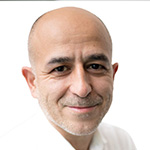TPS-Therapy for Long-Covid and Neuro-Covid
Initial Research shows: TPS could become an Authoritative Treatment Tool.
The traces of the COVID-19 pandemic are also becoming increasingly evident in the scientific community. It is true that most of those infected recover well from acute corona illnesses. But about 10% of those affected, according to the latest studies (as of January 2023) suffer from Long Covid disease. That is currently about 65 million people worldwide, and no one can determine prognoses for the future. The big problem here is that there are still no real diagnostic and treatment options for these more than 200 symptomatologies identified to date that are assigned to Long Covid Disorders.
Therefore, in the case of long-covid disorders, we do not yet have any recognized therapeutic procedures at all and thus no corresponding guidelines (the German government plans to have developed a first guideline for the treatment of long-covid in December 2023). Therefore, the currently used medical procedures are all only so-called cure trials.
Neuro Covid: 80% of the Consequences of Corona manifest with Neurological Symptoms.
In this regard, the long-term effects of Corona viruses are most evident in relation to the human nervous system. The American Academy of Neurology recently reported that Long Covid is now the third most common neurological disease worldwide.
Therefore, experts have established their own definition of the neurological sequelae of the COVID-19 virus: Neuro-Covid is the name given to those diseases that affect the functions or dysfunctions of the brain.
Researchers currently assume that about 80% of long covid patients also or primarily suffer from neuro-covid. According to current studies and surveys, 50 to 80% of those affected report fatigue, a multifactorial symptom characterized by severe fatigue and exhaustion, depending on the reading. 50 to 60% of those affected report “brain fog” and other cognitive symptoms such as concentration problems, forgetfulness and even dementia. Furthermore, many affected persons suffer from myalgia, i.e. nerve pain, depression and anxiety up to psychotic episodes. Headaches, visual problems, sleep and olfactory disturbances are added.
Scientists are now warning that the number of dementia cases resulting from corona infections will again rise sharply in the coming years. This is another reason why a detailed understanding of the neuro-covid phenomenon is urgently needed, so that this new disease can be detected more quickly and treated more specifically accordingly.
Great success with Transcranial Pulse Stimulation: Healing trials show Efficacy
In the search for meaningful and effective treatment methods, researchers also consider transcranial pulse stimulation to be a means of choice for targeted and/or supportive treatment of neuro-covid.
Within the framework of the healing trial* recognized in Germany, the TPS therapy was able to show in meanwhile 200 (as of January 2023) neuro-covid patients that their symptomatology could be significantly reduced after mostly only three individual treatments with the TPS therapy and led to general freedom from symptoms.
Due to the mechanisms of action on the human brain, this therapy approach is also only logical for Neuro-Covid. Currently, scientific working groups are working intensively on transcranial pulse stimulation in Long-Covid and Neuro-Covid and it is already clear that we will be able to issue an even clearer therapy recommendation with meaningful and validatable data by the end of the quarter 2023.
* An individual therapeutic trial is an application of a drug or therapeutic procedure in an individual case, which the physician decides on alone and on his or her own initiative within the framework of therapeutic freedom with the patient’s consent. A therapeutic trial is only appropriate if all other treatment options have been exhausted and if a benefit for the patient concerned can be assumed on the basis of scientific findings. In the case of an individual therapeutic trial, therefore, the focus is only on curing the individual patient; gaining knowledge about the drug is not an objective, but may nevertheless take place).

